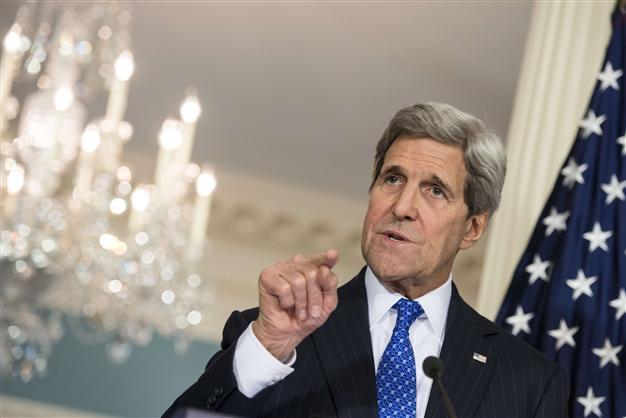Anti-ISIL coalition talks focus on jihadist threat
LONDON - Agence France-Presse

AFP Photo
Top officials from 21 countries kicked off talks in London on Jan. 22 on pushing back Islamic State of Iraq and the Levant (ISIL) militants in Iraq and Syria and tackling the growing threat of homegrown jihadists in Europe.
US Secretary of State John Kerry and British Foreign Secretary Philip Hammond co-hosted talks involving 21 of some 60 countries that are working together to tackle the militant ISIL group based in Syria and Iraq.
It will be the first time the US-led coalition has met since this month's attacks in Paris against the satirical magazine Charlie Hebdo and a Jewish supermarket that left 17 people dead.
"Terrorists want to drive us apart, but in fact their actions have had the opposite effect, they're bringing us together," Kerry said ahead of the talks.
He also called for international action on "the root causes, so that terrorist appeals fall flat and foreign recruits are no longer enticed to go to a place and wreak havoc on it".
A US state department official said foreign fighters would be a "real focus" of the meeting and that an expert working group would be formed on sharing information to stop militants travelling.
Twelve people were killed in a shooting at Charlie Hebdo this month by gunmen affiliated with Al-Qaeda, while a third attacker who shot dead a policewoman and attacked a Jewish supermarket, killing four, claimed he was working on behalf of ISIL.
The attacks rekindled fears about the dangers posed by well-trained homegrown jihadists returning from foreign battlefields.
European police agency Europol estimates up to 5,000 EU citizens have gone to join the ranks of militants in Syria and Iraq.
EU foreign policy chief Federica Mogherini said the attacks in France "were a little bit like our own 9/11", hitting at "symbols of our culture, of our values, like the media freedom, the police, the Jewish community".
Meanwhile, Belgian authorities were still hunting for two men on the run after police broke up a jihadist cell last week, while French authorities charged four men with helping one of the Islamist gunmen responsible for the Paris shootings.
Looming over the meeting is also the deadline set by members of the ISIL group for Tokyo to pay a $200 million ransom for the release of two Japanese hostages. Tokyo believes the deadline will expire at 2:50 pm (0550 GMT) on Friday.
Japanese Foreign Minister Fumio Kishida will not be at the London meeting, but held talks with Hammond on Wednesday as Japanese Prime Minister Shinzo Abe admitted it was a "race against time" to free the men.
Speaking to BBC Radio 4 before the talks, Hammond warned that the Iraqi army might be months away from mounting a sustained fightback against ISIL.
"We are renewing and regenerating the Iraqi security forces -- re-equipping them, retraining them, reorganising them -- but it will be months yet before they are ready to start significant combat operations against [ISIL]," he said.
The British minister met with Kerry and French foreign minister Laurent Fabius ahead of the main meeting in London's Lancaster House.
Across town in Downing Street, Prime Minister David Cameron also held talks with Iraqi counterpart Haider al-Abadi.
Abadi defended his country's efforts to repel ISIL, saying the "Iraqi people have sacrificed their lives" to halt its advance.
"We have reversed, some time ago, the advances of Daesh [ISIL] and we are very keen to push them back from the whole of Iraq," he told Cameron.
Ministers will also discuss military efforts to support both Iraqi and Kurdish armed forces, how to cut ISIL financing, and supplying aid for those caught in the crossfire.
The countries confirmed to be attending Thursday's conference are Australia, Bahrain, Belgium, Canada, Denmark, Egypt, France, Germany, Iraq, Italy, Jordan, Kuwait, the Netherlands, Norway, Qatar, Saudi Arabia, Spain, Turkey and the United Arab Emirates.
The coalition last met in Brussels in December.
